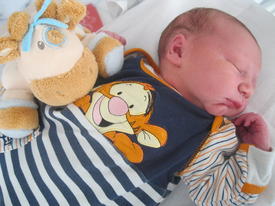An Email Response that Might Help Some ...

TrainerRobin
Posts: 509 Member
I just answered an email that I got and as I was writing it, I thought that for some it might be helpful. So I'm sharing here:
Hello, you asked me why it's a bad thing to lose lean body mass. vs other kinds of body mass.
Think of it as though the lean body mass (your bones, organs blood, and muscle tissue, etc.) are your engine. They all take energy to "run" every minute of the day. The fat stored on your body is like your fuel tank, there to provide energy (fuel) for the operation of your body. With that in mind, think about what kind of engine would burn through a fuel tank quicker -- a fuel efficient little Hyundai engine or a big truck engine? Of course the bigger engine would consume the fuel faster, and that's exactly how our bodies work. People with large muscle mass (in addition to their bones, organs, etc.) burn through much more energy (calories) than people with lesser muscle mass. In addition to the other positive reasons for wanting strong and flexible muscles, burning through extra fat is another great benefit. It's bad to lose this lean muscle because doing so will reduce our caloric need and slow our weight loss. Lean muscle mass loss also has consequences down the road.
Imagine that two identical 165 pound (30% body fat or 49.5 pounds of fat) women go on two different weight loss programs. Woman A is on a low calorie diet and is walking but isn't doing any weight training. Woman B is on a low calorie diet (although she can eat a bit more than woman A) and she is walking AND doing resistance training (weight lifting). After two weeks, woman A may lose 4 pounds, and about 1 pound of it will be fat. Woman B may lose only 3 pounds but 2.5 will be fat. Continue this out with examples from real clients I've worked with (the first number is her new weight and after the slash is the number of fat pounds she lost):
Woman A Woman B
Week 2 161/1 162/2.5
Week 4 156/1.5 158/3.1
Week 6 152/.9 155/2.0
Week 8 151/.25 152/1.5
Week 10 149/0 149/1.8
At the end of ten weeks, Woman A has lost 12 pounds, as has Woman B.
But their body composition has changed.
Woman A has lost 3.65 pounds of fat, which means that the rest of the 8.35 pounds were lean muscle mass.
Woman B has lost 10.9 pounds of fat, which means that the rest of her 1.1 pounds lost were lean muscle mass.
Woman A now has 45.85 pounds of body fat. At 149 pounds, that makes her 30.8% body fat.
Woman B now has 38.6 pounds of body fat. At 149 pounds, that makes her 25.9% body fat.
Woman A is now actually FATTER (30.8% body fat compared to her starting body fat of 30%).
Woman B is now healthier at only 25.9% body fat.
But think about the "engine". Woman A's engine weighs 103.1 pounds. Woman B's engine now weighs 110.4 pounds. Which engine is going to need more calories? Of course, woman B is going to burn more calories. That means two things. It'll be much easier for her to continue to lose weight if she so desires. It also means that if she's intending to maintain that weight, she'll be able to eat more food and STAY at that weight. Conversely, that means that Woman A is going to gain weight back much faster if she overeats much. And she won't be able to eat as much as Woman B, so in practical terms, it's going to be less likely she'll stick with it for life because she'll now have to get by on fewer calories for life.
You also asked why the body picks and chooses between lean body mass and body fat? And you wondered whether our body fat is there for the sole purpose of getting us through a "famine" (or low calorie diet in today's terms).
Our body does indeed store fat for reserves. And it knows when it should hang onto that fat. At heavier weights, the body has little to worry about (it has plenty of fat stores left!) so it tosses the fat overboard with abandon. Think of how fast the folks on Biggest Loser lose weight. But as it nears it's goal it starts to get a little nervous about maybe running out. That gas tank is mighty low even though you're looking good! As such, it becomes more important for you to eat, as you grow increasingly near your weigh goal, more of your exercise calories so your body feels comfortable that you're eating enough and it doesn't need to worry about the low "reserves." It doesn't worry that there is a famine around the corner! Eat too little, and you'll trigger a metabolic slowdown. Not a big deal for those with much to lose, but a big issue for those nearing their weight goals.
Hope that helps you out some ... let me know if I failed to answer any part of your question.
Good luck!
Hello, you asked me why it's a bad thing to lose lean body mass. vs other kinds of body mass.
Think of it as though the lean body mass (your bones, organs blood, and muscle tissue, etc.) are your engine. They all take energy to "run" every minute of the day. The fat stored on your body is like your fuel tank, there to provide energy (fuel) for the operation of your body. With that in mind, think about what kind of engine would burn through a fuel tank quicker -- a fuel efficient little Hyundai engine or a big truck engine? Of course the bigger engine would consume the fuel faster, and that's exactly how our bodies work. People with large muscle mass (in addition to their bones, organs, etc.) burn through much more energy (calories) than people with lesser muscle mass. In addition to the other positive reasons for wanting strong and flexible muscles, burning through extra fat is another great benefit. It's bad to lose this lean muscle because doing so will reduce our caloric need and slow our weight loss. Lean muscle mass loss also has consequences down the road.
Imagine that two identical 165 pound (30% body fat or 49.5 pounds of fat) women go on two different weight loss programs. Woman A is on a low calorie diet and is walking but isn't doing any weight training. Woman B is on a low calorie diet (although she can eat a bit more than woman A) and she is walking AND doing resistance training (weight lifting). After two weeks, woman A may lose 4 pounds, and about 1 pound of it will be fat. Woman B may lose only 3 pounds but 2.5 will be fat. Continue this out with examples from real clients I've worked with (the first number is her new weight and after the slash is the number of fat pounds she lost):
Woman A Woman B
Week 2 161/1 162/2.5
Week 4 156/1.5 158/3.1
Week 6 152/.9 155/2.0
Week 8 151/.25 152/1.5
Week 10 149/0 149/1.8
At the end of ten weeks, Woman A has lost 12 pounds, as has Woman B.
But their body composition has changed.
Woman A has lost 3.65 pounds of fat, which means that the rest of the 8.35 pounds were lean muscle mass.
Woman B has lost 10.9 pounds of fat, which means that the rest of her 1.1 pounds lost were lean muscle mass.
Woman A now has 45.85 pounds of body fat. At 149 pounds, that makes her 30.8% body fat.
Woman B now has 38.6 pounds of body fat. At 149 pounds, that makes her 25.9% body fat.
Woman A is now actually FATTER (30.8% body fat compared to her starting body fat of 30%).
Woman B is now healthier at only 25.9% body fat.
But think about the "engine". Woman A's engine weighs 103.1 pounds. Woman B's engine now weighs 110.4 pounds. Which engine is going to need more calories? Of course, woman B is going to burn more calories. That means two things. It'll be much easier for her to continue to lose weight if she so desires. It also means that if she's intending to maintain that weight, she'll be able to eat more food and STAY at that weight. Conversely, that means that Woman A is going to gain weight back much faster if she overeats much. And she won't be able to eat as much as Woman B, so in practical terms, it's going to be less likely she'll stick with it for life because she'll now have to get by on fewer calories for life.
You also asked why the body picks and chooses between lean body mass and body fat? And you wondered whether our body fat is there for the sole purpose of getting us through a "famine" (or low calorie diet in today's terms).
Our body does indeed store fat for reserves. And it knows when it should hang onto that fat. At heavier weights, the body has little to worry about (it has plenty of fat stores left!) so it tosses the fat overboard with abandon. Think of how fast the folks on Biggest Loser lose weight. But as it nears it's goal it starts to get a little nervous about maybe running out. That gas tank is mighty low even though you're looking good! As such, it becomes more important for you to eat, as you grow increasingly near your weigh goal, more of your exercise calories so your body feels comfortable that you're eating enough and it doesn't need to worry about the low "reserves." It doesn't worry that there is a famine around the corner! Eat too little, and you'll trigger a metabolic slowdown. Not a big deal for those with much to lose, but a big issue for those nearing their weight goals.
Hope that helps you out some ... let me know if I failed to answer any part of your question.
Good luck!
0
Replies
-
Thanks for these examples!0
-
Cheers for that...really informative!!!!0
-
This is awesome! I am going to put this in my signature! so other people will read this when they wonder about why they need to eat more as they get smaller! seems to be a repetitive question that is commonly tied in with eating exercise calories!0
-
LOVE this!!!0
-
Awesome explanation!0
-
Awesome post.... I have been trying to explain this all day...0
-
Thank you very much0
-
bump!0
-
I just added a link to this post to my signature! Thanks for the info and examples!!!!!! Very helpful !!!0
-
This is very useful information. Thank You!0
-
bump0
-
Thanks for the reminder I haven't been doing weight training this week. But I work as a waitress so I lift a lot at work. The work keeps me strong, however more weight training only helps me at work.0
-
how many times a week should weight lifting be done, and should a specific area of the body be worked on instead of just doing different types of weights a day?
this is an area I am confused about, i want to do some weights but when I get to the gym I'm like, what do i do!
would something like this be helpful:
http://www.walmart.com/ip/Amber-Sporting-Goods-Doory-Gym/131265440 -
Great explanation. Your posts are always well-crafted. I appreciate the time you take to present sometimes complicated information in accessible terms.0
-
BUMP:flowerforyou:0
-
Great post, very helpful! Thank you.0
-
bump.....................0
-
Bump!!0
-
bump0
-
bump0
-
bump
and makes me so pleased I decided this week to start weight training alongside my cardio0 -
thanks for posting!0
-
Bump!0
-
Bump0
-
So how do I know my body fat percentage? And what sort of calorie range should I be going for?
I'm 5'0 and weigh 143 lbs. I seem to yo-yo from 145 to 140 easily (within days), but can't seem to lose a sginificant amount of weight and keep it off. Is this what you are talking about? Do I actually need to increase my daily calories to lose this weight instead of struggling to decrease the amount of calories? That is a very scary concept!
And to further this extra calorie / exercise thing - should I eat back the calories I burn off? Cause that seems counter-productive. I always thought weight loss was achieved by taking in less calories than you burn ... so if i burn through 1200 calories in a day I need to eat 1000 to lose weight. But obviously my thinking is flawed as I can't get into the "normal" weight range for my body.
I just want to do this right and see real results that last and that aren't crazy difficult to maintain. It shouldn't be hard to maintain a healthy weight - isn't that why it's considered a healthy weight (because your body should naturally want to be that size on its own)?0 -
Wow, very eye opening. I will need to start doing some weight training but not sure how to. I am already walking and running on occasion but have not incorporated weight training. I need to learn that aspect of it because I know it would help me along the way.0
-
Bump! Thanks for sharing this...its wonderful0
-
This is fantastic, great explanation. Thank you so much for taking the time to share this information.0
-
Very helpful thank you0
-
Great post. I am so glad you shared it!0
This discussion has been closed.
Categories
- All Categories
- 1.4M Health, Wellness and Goals
- 398.1K Introduce Yourself
- 44.7K Getting Started
- 261K Health and Weight Loss
- 176.4K Food and Nutrition
- 47.7K Recipes
- 233K Fitness and Exercise
- 462 Sleep, Mindfulness and Overall Wellness
- 6.5K Goal: Maintaining Weight
- 8.7K Goal: Gaining Weight and Body Building
- 153.5K Motivation and Support
- 8.4K Challenges
- 1.4K Debate Club
- 96.5K Chit-Chat
- 2.6K Fun and Games
- 4.8K MyFitnessPal Information
- 12 News and Announcements
- 21 MyFitnessPal Academy
- 1.5K Feature Suggestions and Ideas
- 3.2K MyFitnessPal Tech Support Questions


























